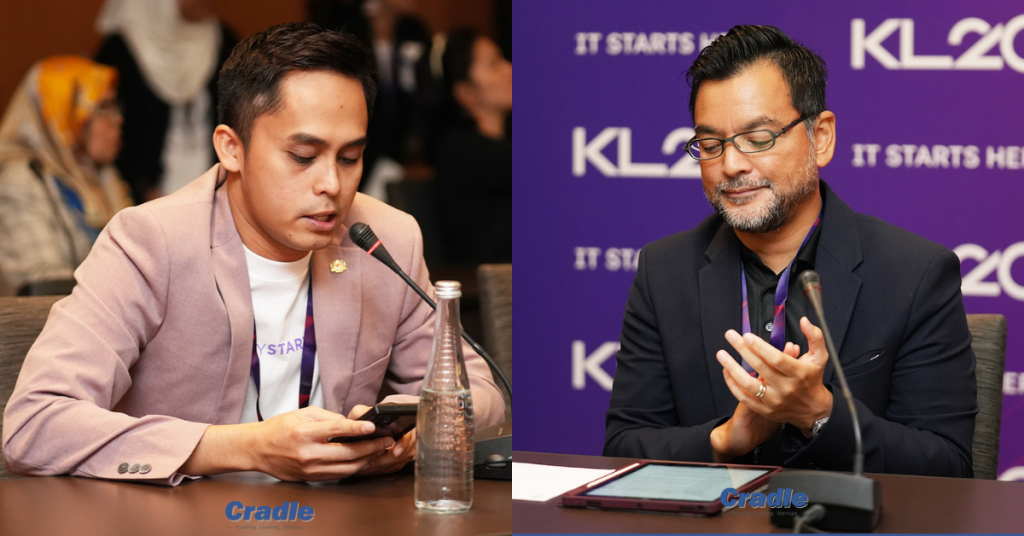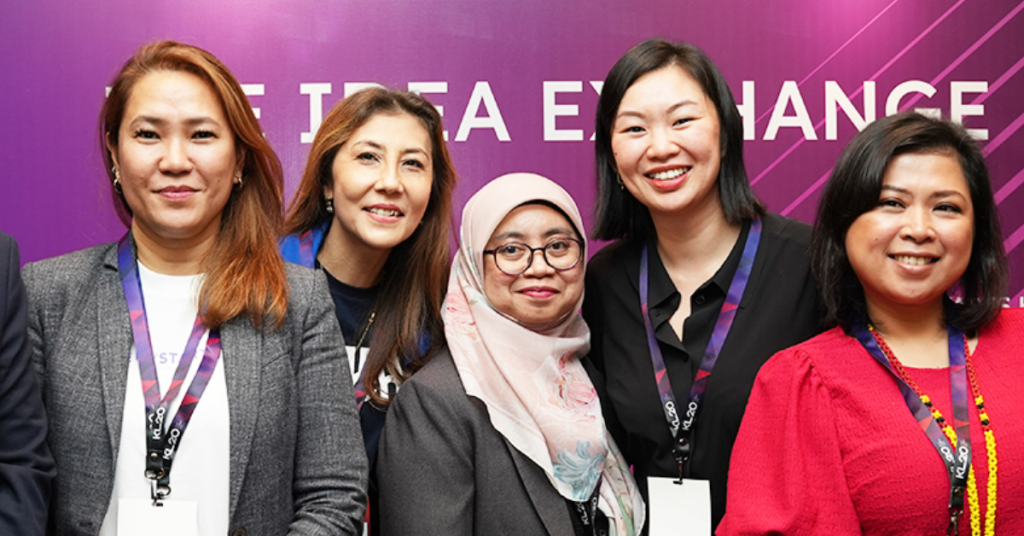While many eyes were on KL20 Summit’s main Leader and Founder stages, there was also something called the Catalyst Corner where a variety of different side events were being held.
One such event was called “Catalyst for Change: She Runs the World”. Organised by Cradle Fund and Women in Tech as a roundtable discussion, it was meant to foster discussions around female empowerment and entrepreneurship.
And before you complain about whether such a panel is still needed, here are some fast facts.
The 2023 World Economic Forum’s Global Gender Gap Report had ranked Malaysia as 102nd out of 146 countries, and showed that we were far behind compared to our neighbours when it comes to gender equality.
So yes, there are still many conversations that need to be had about the state of our gender equality.
The panel comprised of:
- Yuki Aizawa, the APAC Director for Women in Tech
- Juliana Jan, the Senior Vice President in Grant & Investment for Cradle
- Viviantie Sarjuni, the CEO of SCENIC
- Shermaine Wong, Cult Creative’s co-founder and CEO
- Norilmi Amilia Ismail, SpaceIn’s CEO
The conversation was moderated by Tunku Danny Mudzaffar, the founder and CEO of microLEAP, a company that helps micro-enterprises secure investments and democratise investing.

Something particularly memorable to me was that towards the end of the session, there had been a well-intentioned question thrown out to the panellists.
The participant started by saying that he’s worked with women all his life, so he wondered what’s stopping women from running the world.
“Is it mentality? Is it really discrimination?” he wondered.
It was quite the poignant question, one that all the panellists were inadvertently answering throughout the talk—or perhaps, even, throughout their whole careers.
His question is one that was echoed by Cradle Fund’s Juliana Jan, who shared earlier on in the session that from a funder’s point of view, the issue didn’t lie in discrimination, but rather, the fact that there are simply too few women applying for funds.
So, why aren’t more women participating?
It’s a leaky pipe
A quick answer to that question can be found in the manifesto of Women in Tech, which is “From the Classroom to the Boardroom”.
Essentially, yes, there is a pipeline from the classroom to the boardroom. But it’s one with lots of holes that require fixing.
The drop-off from education to the workplace is like a chicken and egg problem. Yuki pointed out that there is a lack of role models for young women especially in STEM, which then leads to less women wanting to join those sectors.
That’s one reason why having events such as these are important—to increase the visibility of ladies leading their fields.
But more than just seeing female leaders, it’s important to have clear and visible pathways to everyday jobs. In other words, there’s a need for “everyday champions” to be highlighted.
It’s not always a meritocracy (biases)
Arguably, an ideal society would be one that is merit-based, that fairly assesses talents instead of gender.
For one, that’s what Juliana said Cradle aims to do.
Unfortunately, men may often underestimate women’s capabilities. They may not be fairly judged for a myriad of reasons.
At the same time, some women underestimate their own capabilities and performance. You might think of this as the impostor syndrome or the confidence gap, which goes back to the first point.
“It’s happened to me,” Norilmi from SpaceIn said.

Double-hatting as a lecturer, many tend to assume that she doesn’t know anything about business. Of course, that presumption typically backfires when Norilmi shows that she does have business savviness as a domain expert.
She said that it’s important to grow the resilience to overcome these assumptions that you may face in the industry, and recognise that it might not be a fair assessment of your real capabilities.
Activism overlooks intersectionality
When it came SCENIC CEO Viviantie’s turn to speak, she was asked, “With Sabah having the highest rural population in Malaysia, do you see inherent biases or societal exploitations?”
“All the time,” she answered.
SCENIC, for those who may not know, is the Sabah Creative Economy and Innovation Centre.
Viviantie who is a Sabahan herself shared that she often hears many underhanded comments such as “for a Sabahan, you are quite smart”.
“We’re made to believe we’re not good enough,” she shared. She brought up an incident she experienced at a social enterprise, where a woman had to drop out. She said she couldn’t continue her journey with them because her husband wouldn’t allow her.
These issues are commonplace in rural areas where opportunities are scarce and support even scarcer.
Overlooking the woes that women in rural areas face hurts women overall, which is why it’s crucial not to leave them out of the conversation.
Women shoulder many responsibilities and societal expectations
It’s not just in rural areas that this is happening, of course.
There are many cultural expectations that modern women face still, such as the expectation to defer to men as well and always put the family first.
Norilmi’s solution to this was by finding and forming communities of women who can support one another.

However, especially for mothers, it can be difficult to network with others on top of caring for their children. Many sacrifices would have to be made.
“Time is very limited,” Shermaine of Cult Creative had said at one point. “It goes back to having support. Supportive partners, co-founders, and work environment.”
And of course, there needs to be a supportive ecosystem overall. The ecosystem should be developed in a way where mentorship and community are easily accessible. That way, we’ll start seeing more submissions and applications from women overall.
You’ve got to virtue signal
At the end of the day, intentionality is key.
Sure, it might seem counter-intuitive to have to mandate a quota for women’s participation. It might feel like pigeonholing women entrepreneurs when there is a female panel at every conference.
But until this practice becomes so ingrained into society that it’s a norm, these efforts will be necessary.
As Yuki said, whether we like it or not, we must be intentional about have female representation. In that same way, the boardroom must be intentional about hiring women. Platforms must be intentional about welcoming women to submit their applications.
In other words, in order for women to be running the world, we must be intentional about it. With that, the rest will follow.
- Read other articles we’ve written about KL20 Summit 2024 here.
Featured Image Credit: Cradle Fund











